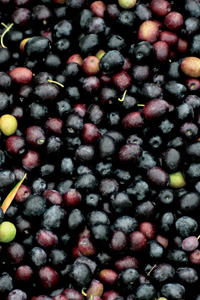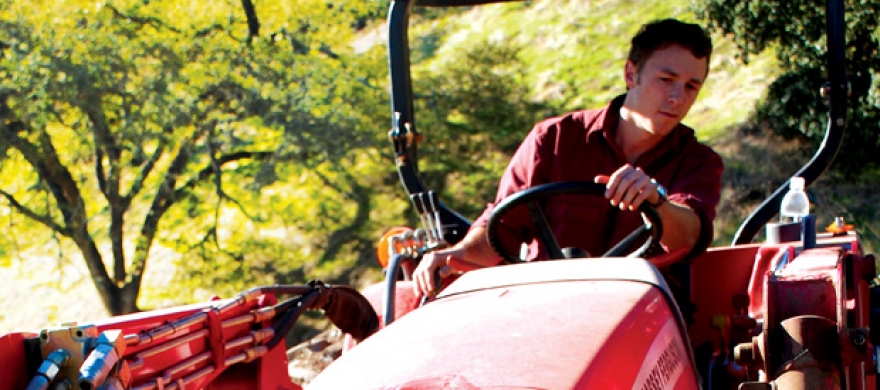Prince of the Press
Award-winning olive oil taster Elliott Taylor puts his discriminating palate to work.
Draped in the mist of its Mediterranean climate, the Northern California hideaway of St. Helena, set among the pastoral idylls of Napa County, is home to lush vineyards and valleys of international renown. Also nestled in the verdant landscape are fragrant olive groves, where Seaver College student Elliott Taylor first became captivated by the epicurean craft of olive oil tasting.
Growing up in Orinda, California, and on his family’s bucolic St. Helena property, Taylor learned the ins and outs of the culinary world while traveling to and from nearby restaurant openings with his father, a successful commercial contractor and developer. “I was his buddy that he would drag to all of these events,” recalls Taylor, “so I grew up surrounded by chefs, restaurants, and food.”
 At nearby wineries in his teens, “each would bring me olive oil to taste,” Taylor
reminisces. “Before I knew it, I found myself attending seminars and taking a test
to become an apprentice on the California Olive Oil Council (COOC) panel.” After passing
the highly competitive exam, Taylor became the youngest person at the COOC tasting
table.
At nearby wineries in his teens, “each would bring me olive oil to taste,” Taylor
reminisces. “Before I knew it, I found myself attending seminars and taking a test
to become an apprentice on the California Olive Oil Council (COOC) panel.” After passing
the highly competitive exam, Taylor became the youngest person at the COOC tasting
table.
The 21-year-old has since been trained to swirl, sniff, and taste the rich, scented olive oils that have been carefully measured, heated to 82 degrees Fahrenheit—the prime temperature to release the maximum amount of aroma—and presented in cobalt-tinged glasses to disguise the color so as not to influence the taster’s judgment. “It’s crazy what you can pick up,” he says of the discriminating palate he has developed as a California olive oil taster. “If someone plants a couple orange trees near the olive trees, the taster can pick it up.”
Becoming fluent in the language of olive oil, moreover, is all about practice. “Each panelist has gone through years of training,” he notes. “It’s very intense. Less than 20 percent of the human population has the ability to detect threshold levels of defects, and I was worried I wouldn’t be able to do it.”Interacting with the other panelists, including both harvesters and producers with various professional backgrounds, has become more than just a hobby for the olive aficionado. Taylor eagerly sought their advice on what trees to plant, ideal climate, and location, then set out to produce an award-winning blend of his own—with a twist.
“A majority of the olive oils produced in St. Helena are Tuscan or French. No one has done the specific Spanish varietal that we will be trying to achieve,” he explains of plans to incorporate imported varietals from Argentinian olive trees not yet found in North America. After combining Manzanillo, Sevillano, and Arbequina olives—a California heritage blend—grown and harvested on the Taylor family property, Prince Olive Estancia was born and its first artisan oil was certified “extra virgin” by the COOC.
Keeping true to the small-scale philosophy, Prince Olive Estancia’s staff is comprised of members of the Taylor clan, including older sister Jenefer (’08), who is in charge of marketing and event planning at the property.
Nurtured by the Taylors from pick to press, the smooth and pungent oil went on to win a Gold Medal at the 2011 California Olive Oil Competition, an accolade that drew interested stockists and mass producers to the family’s door. Taylor asserts, however, that Prince Olive Estancia products will not be found lining local grocery store shelves anytime soon. “I want to keep the exclusivity really strong,” he emphasizes. “I want to keep it as a boutique olive oil production estate in St. Helena and keep production at 200 to 300 bottles.”
Maintaining an award-winning olive crop is not without its challenges. Fears of frost and fruit flies run rampant in the Napa climate. “We have a small amount of trees, so we’ve spent a lot of time giving them attention,” explains Taylor. “If any problems ever arose, we were right on top of it, but we haven’t had to replace a tree and haven’t ever lost a season.”
No longer the youngster at the tasting table, Taylor’s peers now pay more attention to what he has to say, though he remains humble about his success. “I never got into this to make a bunch of money,” he says. “We could plant 800 trees and, with the Gold Medal winning, put it into tons of stores and mass produce it and ship it overseas. But ultimately it’s a really fun hobby and we’ve taken it to an exciting level. It’s only going to go up from here.”
